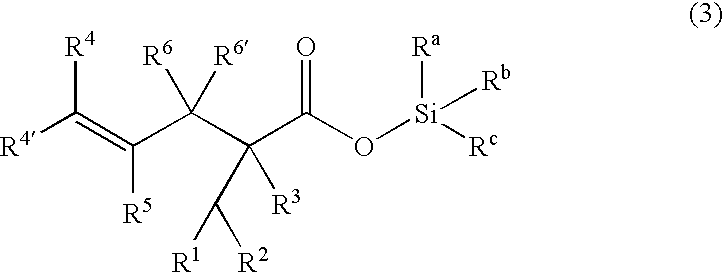Processes of making gamma,delta-unsaturated carboxylic acid and silyl ester thereof, carboxyl group-containing organosilicon compound and process of making
a technology of deltaunsaturated carboxylic acid and silyl ester, which is applied in the preparation of carboxylic acid esters/lactones, organic chemistry, silicon organic compounds, etc., can solve the problems of reducing the yield per unit reactor volume, the cost, the reaction time, and the yield of ,-unsaturated aldehyde used as the starting material is not always satisfactory, and achieves high yield
- Summary
- Abstract
- Description
- Claims
- Application Information
AI Technical Summary
Benefits of technology
Problems solved by technology
Method used
Image
Examples
first embodiment
The process of preparing a γ,δ-unsaturated carboxylic acid and silyl ester thereof in the invention involves reacting an α,β-unsaturated carboxylic acid ester of the general formula (1) with a hydrosilane or hydrosiloxane of the general formula (2).
Herein Ra, Rb and Rc are each independently selected from among alkyl groups of 1 to 20 carbon atoms, preferably 1 to 18 carbon atoms, aryl groups of 6 to 20 carbon atoms, preferably 6 to 12 carbon atoms, aralkyl groups of 7 to 20 carbon atoms, preferably 7 to 14 carbon atoms, alkoxy groups of 1 to 20 carbon atoms, preferably 1 to 10 carbon atoms, aryloxy groups of 6 to 20 carbon atoms, preferably 6 to 12 carbon atoms, aralkyloxy groups of 7 to 20 carbon atoms, preferably 7 to 14 carbon atoms, organosiloxy groups of 1 to 1,000 silicon atoms, preferably 1 to 200 silicon atoms in which a group bonded to a silicon atom is a monovalent hydrocarbon group of 1 to 20 carbon atoms, preferably 1 to 18 carbon atoms (e.g., alkyl or aryl) or hydroge...
example 1
Synthesis of triethylsilyl 2,2-dimethyl-4-pentenoate by Reaction of Allyl Methacrylate with Triethylsilane
A 300-ml four-necked flask equipped with a Dimroth reflux condenser, stirrer, thermometer and dropping funnel was purged with nitrogen. The flask was charged with 25.6 mg (0.050 mmol) of tris(pentafluorophenyl)borane (by Aldrich, lot No. 18609AO, same hereinafter), 1.29 g of 1,3,5-tris(3,5-di-tert-butyl-4-hydroxybenzyl)-2,4,6-trimethylbenzene (Irganox 1330, Ciba Specialty Chemicals), and 58.2 g (0.50 mol) of triethylsilane, which were stirred at room temperature for 0.5 hour. The flask was heated in an oil bath to an internal temperature of 40° C., after which 37.9 g (0.30 mol) of allyl methacrylate was added dropwise over 2 hours from the dropping funnel. Since exothermic heat was observed during the dropwise addition, the oil bath heating was adjusted so as to maintain an internal temperature of 40-50° C. A 10% toluene solution of 12.8 mg (0.025 mmol) tris(pentafluorophenyl)...
example 2
Synthesis of ethoxydimethylsilyl 2,2-dimethyl-4-pentenoate by Reaction of Allyl Methacrylate with Ethoxydimethylsilane
A 100-ml four-necked flask equipped with a Dimroth reflux condenser, stirrer, thermometer and dropping funnel was purged with nitrogen. The flask was charged with 220 mg of BHT, 5 ml of toluene, and a 10% toluene solution of 2.6 mg (0.005 mmol) tris(pentafluorophenyl)borane. While the contents were stirred, the flask was cooled at 4° C. in an ice water bath. A mixture of 12.6 g (0.10 mol) of allyl methacrylate and 10.4 g (0.10 mol) of ethoxydimethylsilane was added dropwise over 3.5 hours from the dropping funnel. The internal temperature rose to 12° C. at maximum. After the completion of dropwise addition, the contents were stirred at 4° C. for a further 2 hours. Then 7 μl (0.05 mmol) of triethylamine was added to the reaction mixture, which was vacuum distilled, collecting 19.7 g of a colorless clear fraction having a boiling point of 61-62° C. / 0.7 kPa. On NMR an...
PUM
 Login to View More
Login to View More Abstract
Description
Claims
Application Information
 Login to View More
Login to View More - R&D
- Intellectual Property
- Life Sciences
- Materials
- Tech Scout
- Unparalleled Data Quality
- Higher Quality Content
- 60% Fewer Hallucinations
Browse by: Latest US Patents, China's latest patents, Technical Efficacy Thesaurus, Application Domain, Technology Topic, Popular Technical Reports.
© 2025 PatSnap. All rights reserved.Legal|Privacy policy|Modern Slavery Act Transparency Statement|Sitemap|About US| Contact US: help@patsnap.com



